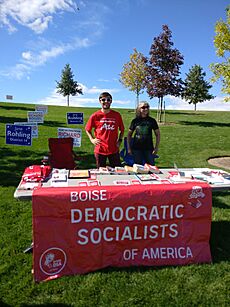Democratic Socialists of America facts for kids
Quick facts for kids
Democratic Socialists of America
|
|
|---|---|
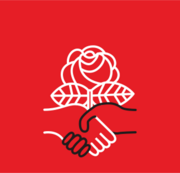 |
|
| Abbreviation | DSA |
| Governing body | National Political Committee |
| National Co-Chairs | Megan Romer Ashik Siddique |
| National Director | Vacant |
| Founder | Michael Harrington |
| Founded | March 20, 1982 |
| Merger of | Democratic Socialist Organizing Committee New American Movement |
| Headquarters | New York, NY |
| Newspaper | Democratic Left Socialist Forum |
| Youth wing | Young Democratic Socialists of America |
| Membership (2024) | |
| Ideology |
|
| Political position | Left-wing |
| Regional affiliation | São Paulo Forum (associate member) |
| International affiliation |
|
| Colors | Red |
| Members in the House of Representatives |
4 / 435
|
| Members in state upper chambers |
12 / 1,973
|
| Members in state lower chambers |
42 / 5,413
|
| Members in other offices | 143 |
The Democratic Socialists of America (DSA) is a multi-tendency, democratic socialist political organization in the United States. After the Socialist Party of America (SPA) transformed into Social Democrats, USA, Michael Harrington formed the Democratic Socialist Organizing Committee (DSOC). The DSOC later merged with the New American Movement (NAM) to form the DSA. The organization is headquartered in New York City and has about 80,000 members. It leads organizing and protest campaigns, and has members in the House of Representatives, state legislatures, and other local offices.
Upon the organization's founding, Harrington and the socialist feminist author Barbara Ehrenreich were elected co-chairs. After the merger, the DSA became the largest socialist organization in the United States, with a membership of approximately 5,000 ex-DSOC members and 1,000 ex-NAM members.
From 2015 to 2021, DSA membership increased 15-fold from 6,200 after Bernie Sanders's 2016 presidential campaign, the presidential victory of Donald Trump, the 2018 election of DSA member Alexandria Ocasio-Cortez, and the COVID-19 pandemic. Membership peaked at 95,000 in 2021, when the organization had 239 local chapters, before declining to 77,575 members by August 2023. The organization has gained at least 2,400 new dues-paying members since October due to its pro-Palestinian stance during the Israel-Hamas war. Between 2013 and 2017, the median age of its membership declined from 68 to 33, leading some, such as Holly Otterbein of Philadelphia, to credit the organization for the rise of millennial socialism.
The DSA's stated goal is to participate in "fights for reforms today that will weaken the power of corporations and increase the power of working people", with a long-term aim of social ownership of production as state-owned enterprises, worker cooperatives, or a planned economy. To this end, it has endorsed candidates for political office and led various organizing campaigns for labor organizing, public electricity, public housing, tenants unions, and support for Palestinian statehood, among others.
The DSA is a decentralized organization with local chapters and dues-paying memberships. Some of its members have run in elections and been elected. Some of its members in Congress have initiated various pieces of legislation central to the modern progressive movement in the United States, including the Medicare for All Act in 2003 by John Conyers and the Green New Deal in 2019 by Ocasio-Cortez. Former longtime members of the United States House of Representatives, including Conyers, Ron Dellums, House Whip David Bonior and Major Owens, have been affiliated with the DSA. As of 2018, three endorsed members of the DSA serving in Congress are Ocasio-Cortez, Rashida Tlaib, and Cori Bush, with Greg Casar serving as an unendorsed member. As of December 2023[update], 55 state lawmakers and 136 local officials were affiliated with the DSA.
Early history and leadership
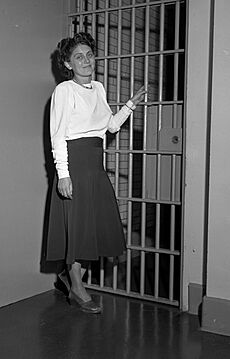
Formed in 1982 by the merger of the Democratic Socialist Organizing Committee (DSOC) and the New American Movement (NAM), the DSA is a 501(c)(4) nonprofit organization. At its founding, it was said to consist of approximately 5,000 members from the DSOC, plus 1,000 from the NAM. Dorothy Ray Healey, a communist and former leading figure of the Communist Party USA, served as Vice Chair in 1982.
The DSA inherited both Old Left and New Left heritage. The NAM was a successor to the disintegrated Students for a Democratic Society. The DSOC was founded in 1973 from a minority anti-Vietnam War caucus in the Socialist Party of America (SPA)—which had been renamed Social Democrats, USA (SDUSA). DSOC started with 840 members, of whom 2% had served on its national board, and approximately 200 of whom came from SDUSA or its predecessors (the Socialist Party–Social Democratic Federation, formerly part of the SPA) in 1973, when the SDUSA stated its membership at 1,800, according to a 1973 profile of Harrington.
The red rose is part of the official DSA logo. It was drawn from the logo of the DSOC, its precursor organization, and previously of the Socialist International, which shows a stylized fist clenching a red rose, the fist replaced by a biracial handshake pertaining to the DSA's staunch anti-racism. The fist and rose logo was originally designed for the French Socialist Party in 1969 and later shared by socialist and labor political organizations worldwide.
DSA's first convention took place in a Manhattan high school on October 14-16, 1983. Guillermo Ungo, leader of the Revolutionary Democratic Front in El Salvador, was a featured speaker. Barbara Ehrenreich was elected co-chair of DSA. Notable attendees included Randall Forsberg and U.S. Representative Ronald Dellums.
DSA's second national convention took place at the Berkeley Community Theater in California on November 9-11, 1985. Featured speakers were Nicaraguan Foreign Minister Miguel d'Escoto and Mpho Tutu, daughter of Desmond Tutu. Notable attendees included Ehrenreich, Michael Harrington, and Cornel West.
Membership
In the early 1980s, the DSOC's estimated membership was 5,000, but after its merger with the NAM and subsequent founding of the DSA, the new organization's membership grew to an estimated 7,000 in 1987.
The DSA's membership greatly increased following Bernie Sanders's 2016 presidential campaign, the presidential victory of Donald Trump, the 2018 election of DSA member Alexandria Ocasio-Cortez, and the COVID-19 pandemic. In May 2020, organizers said the DSA had attracted about 10,000 new members since March of that year. According to DSA leaders, after Sanders dropped out of the 2020 presidential race in April, many supporters previously aligned with his campaign moved over to the DSA.
Ideology
DSA members espouse a range of ideological positions within democratic socialism, including socialist feminism, eco-socialism, democratic road to socialism, and libertarian socialism, as well as progressivism and various forms of communism and anarchism, such as orthodox Marxism, Trotskyism, left communism, autonomism, and anarcho-communism. DSA members have varying positions on market socialism, democratic economic planning, reform and revolution, democratic centralism, and degrowth. The DSA underwent major ideological shifts after 2016, when many young and new members brought the DSA to adopt anti-Zionist and pro-Boycott, Divestment and Sanctions positions as well as to include a wider range of ideological tendencies; and at the 2023 DSA National Convention, where Marxist and revolutionary socialist factions won a majority of seats on the DSA's 2023-2025 National Political Committee.
Economy
The dominant position in DSA regards the abolition of capitalism and the realization of socialism as a long-term goal, therefore the organization focuses its immediate political energies on reforms within capitalism that empower working people while decreasing the power of corporations.
The DSA holds that there are many routes to its goal of democratic socialism, while rejecting social democracy and authoritarian socialism:
We believe there are many avenues that feed into the democratic road to socialism. Our vision pushes further than historic social democracy and leaves behind authoritarian visions of socialism in the dustbin of history.
Welfare policy
A 2009 leaflet detailing the group's ideas, "What is Democratic Socialism?", states that "no country has fully instituted democratic socialism". Nonetheless, according to the DSA, there are lessons to be learned from "the comprehensive welfare state maintained by the Swedes, from Canada's national healthcare system, France's nationwide childcare program, and Nicaragua's literacy programs". The DSA lauds the "tremendous prosperity and relative economic equality" established by the social democratic parties of Scandinavia and parts of Western Europe, while the organization maintains its goal to move beyond capitalism entirely.
Labor
The DSA has been involved in a variety of labor organizing campaigns. In 2020, the DSA and United Electrical, Radio and Machine Workers of America founded the Emergency Workplace Organizing Committee (EWOC) to "help workers organize" by developing training programs and connecting labor organizers with appropriate resources. Jacobin attributed various labor organizing drive and union election victories to the assistance of EWOC organizers. The DSA has frequently adopted the strategy of getting socialists hired in key occupations to establish new unions or reform caucuses within existing unions.
On March 7, 2021, DSA launched a coalitional effort with Communications Workers of America and the International Union of Painters and Allied Trades to pass the Protecting the Right to Organize Act, with rallies and hundreds of thousands of phone calls to voters. Numerous other unions and progressive organizations expressed support for the PRO Act around the same time. During the 117th Congress, the bill passed the House but died in committee in the Senate.
Environment
Though it is controversial within the organization, some DSA members, such as the Caracol caucus, support degrowth, as promoted by such academics as Julia Steinberger, Giorgos Kallis, and Jason Hickel; the International Committee has expressed interest in international degrowth proposals, arguing that they align with Green New Deal principles.
Build Public Renewables Act campaign
In late 2019, the New York City DSA chapter established the Public Power NY Coalition, aimed at expanding public renewable energy in collaboration with organized labor and DSA members in the New York state legislature. According to campaign organizer Ashley Dawson, the Coalition was formed after private utility company Consolidated Edison increased electricity prices; it was also concerned about Consolidated Edison's fossil fuel lobbying, its failure to invest in upgrading its energy infrastructure, and respiratory illnesses caused by pollution in low-income and minority neighborhoods.
In March 2023, DSA members in the U.S. House Alexandria Ocasio-Cortez and Jamaal Bowman wrote to Governor Kathy Hochul to urge the passage of the Build Public Renewables Act (BPRA).
In May 2023, the DSA claimed that the four-year organizing campaign led by New York state chapters enabled the BPRA to pass. DSA and progressive media called it "the biggest Green New Deal victory in U.S. history" due to its provisions for public renewable energy, unionized public jobs, electricity price discounts, and closing natural gas plants.
Migration
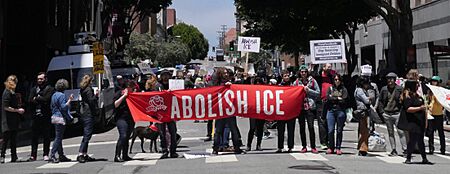
DSA calls for the abolition of U.S. Immigration and Customs Enforcement (ICE), an end to all immigrant detention and deportations, and a "demilitarization" of the Mexico–United States border.
Prisons and police
In the 1990s, the DSA Fund directed resources to the Prison Moratorium Project led by the youth section of DSA, which aimed to divest from private prisons and contributed to Sodexo partially divesting from them.
Foreign policy
The organization was a member of the Socialist International from 1982 to 2017. A majority of delegates at the 2017 DSA National Convention voted to leave the International due to its alleged support for neoliberal economic policies. Delegates at the 2021 DSA National Convention voted to apply to join the São Paulo Forum, and DSA became an Associate Member organization in 2023. Delegates at the August 2023 DSA National Convention voted for the organization to join the Progressive International, and DSA became an official member in October 2023.
Israeli–Palestinian conflict
DSA originally supported Israel and Zionism. When the United Nations passed Resolution 3379 in 1975, which called Zionism a form of racism, Harrington called it a "preposterous charge" that "drain[ed] the concept of racism of any serious meaning." Former DSA vice-chair Jo-Ann Mort has said the group was formerly "the place to go on the left if you were a socialist and you were pro-Israel".
After 2016, DSA shifted toward an anti-Zionist stance, viewing Israel as an imperialist ethnostate. On August 5, 2017, DSA members nearly unanimously passed a resolution to formally endorse the Boycott, Divestment and Sanctions (BDS) movement.
2023 Israel–Hamas war
On October 7, 2023, DSA published a statement saying Hamas's attack that day was the direct result of Israel's "apartheid regime". It went on to condemn all civilian casualties, reaffirm its stance against the occupation of Palestinian territory and support for Palestinian statehood, call for an end to U.S. financial support to the State of Israel, and endorse an initiative by New York State Assembly member and DSA member Zohran Mamdani. The same day, Cori Bush released a statement mourning "the over 250 Israeli and 230 Palestinian lives that have been lost today", criticizing Israel's military response to the attack, and calling for "ending U.S. government support for Israeli military occupation and apartheid". On October 8, Rashida Tlaib released a statement that likewise grieved "the Palestinian and Israeli lives lost yesterday, today, and every day", called for lifting the blockade of the Gaza Strip and ending Israeli occupation and apartheid, and cited U.S. government support for Israel as part of the problem. DSA-endorsed members of Congress—Bush, Tlaib, and Ocasio-Cortez—have all called the State of Israel an apartheid regime, citing human rights abuses against Palestinians.

Over the months following the start of the 2023 Israel–Hamas war, various DSA chapters and DSA rank-and-file members and public officials organized and participated in numerous protests and vigils alongside Jewish and Palestinian advocacy groups, including Jewish Voice for Peace, IfNotNow, and Students for Justice in Palestine, in support of a ceasefire and Palestinian liberation.
On October 8, the New York City DSA chapter promoted a pro-Palestine rally in Times Square. Several New York politicians condemned the rally for statements at the event by Party for Socialism and Liberation member Eugene Puryear mocking the victims of the Re'im music festival massacre and for an unidentified attendee displaying a swastika on a cellphone. The DSA later distanced itself from the rally, as did Ocasio-Cortez and U.S. Representative Shri Thanedar, who claimed he renounced his DSA membership, though a spokesman said he had been expelled a month earlier. Representative Jamaal Bowman confirmed in light of the rally that he had let his DSA membership expire in 2022. In the days after the rally, some socialist magazines such as Jacobin published editorials disputing negative characterizations of DSA, arguing that mainstream media outlets had falsely accused it of supporting Hamas and organizing the rally. Jewish members of DSA denounced Mayor Eric Adams for falsely accusing the DSA of "carrying swastikas and calling for the extermination of Jewish people", calling the accusation "horrific defamation". Progressives outside of DSA as well as opponents of the organization similarly deemed Adams's comments inappropriate and false. In addition to denouncing Adams's comments, Abby Stein wrote disapprovingly in the New York Daily News that other New York politicians, such as Ritchie Torres and Nicole Malliotakis.
On October 13, Mamdani and another DSA New York State Assembly member, Marcela Mitaynes, were arrested for disorderly conduct at a rally in Brooklyn for a ceasefire, organized by Jewish Voice for Peace (JVP), IfNotNow, and Jews for Racial and Economic Justice. Mamdani told media, "We are looking at imminent genocide ... now is not the time to be silent", and said he had received death threats and Islamophobic voicemail messages in the days following the protest.
On October 16, Bush and Tlaib introduced a congressional resolution calling on the Biden administration to call for deescalation and ceasefire in the conflict, and the entry of humanitarian aid to the Gaza Strip. Ocasio-Cortez was also an initial co-sponsor.
On October 20, New York City DSA led a more than 3,000-person protest in Manhattan calling for U.S. Senators Kirsten Gillibrand and Chuck Schumer to support a ceasefire resolution. At the event, 139 protesters were arrested for "acts of civil disobedience as protesters sat down and blocked traffic", including DSA member and New York State Senator Jabari Brisport.
On November 7, the U.S. House of Representatives voted 234–188 to censure Rep. Tlaib for her statements on the war and her use of the phrase "from the river to the sea" to call for a binational one-state solution.
On November 15, JVP, DSA, and IfNotNow held a candlelight vigil and protested at the Democratic National Committee Headquarters in Washington, DC to call for a ceasefire in Gaza during a fundraiser attended by members of Congress. The vigil and protest ended in U.S. Capitol Police clashing with protestors who were "illegally and violently protesting" at the building, according to police, injuring 90 protestors and 6 police officers. Congressmen Representative Brad Sherman and Senator Marco Rubio claimed the protestors were violent and "pro-Hamas."
From November 29 to December 2, DSA officially joined a coalition led by the Adalah Justice Project to carry out a five-day hunger strike outside the White House, with DSA members including New York State Assemblyman Zohran Mamdani, Michigan State Representative Abraham Aiyash, Palestinian writer Sumaya Awad, actress Cynthia Nixon, and then-interim DSA chair Ashik Siddique participating in the strike. Five members of Congress joined the strikers to speak in support on November 29, including Bush and Tlaib.
Russian invasion of Ukraine
On February 26, 2022, the DSA issued a statement condemning Russia's invasion of Ukraine while arguing that the U.S. and NATO provoked Russia. The statement called for "diplomacy and de-escalation to resolve this crisis" and for the U.S. to withdraw from NATO and "end the imperialist expansionism that set the stage for this conflict". Many Democratic members of Congress, including politicians affiliated with the DSA, criticized this statement, with some calling it "tone-deaf". Others defended the statement and criticized the responses from mainstream media and politicians attacking the organization. According to New York, "The suggestion that the U.S. was somehow to blame for Vladimir Putin's war of aggression was seized on by the DSA's critics across the ideological spectrum—from the New York Post to Democratic congressional candidate Max Rose—while setting off a round of recriminations and counterstatements among American leftists."
Venezuela
In June 2021, a DSA delegation of the International Committee traveled to Caracas, Venezuela, to meet with Nicolás Maduro and attend the Bicentennial Congress of the Peoples (Spanish: Congreso Bicentenario de los Pueblos), considered not an autonomous body, but rather "an assemblage of national and foreign supporters" of Maduro launched "to coat itself with a veneer of international support". The DSA International Committee was criticized both externally and by DSA members for giving legitimacy to the Maduro administration, as well as for having its delegation stay at one of Caracas's most expensive hotels, the Gran Meliá Caracas, where rooms cost $200 a night, and for partying despite the COVID-19 restrictions in Venezuela. It was also criticized for giving "a bad name to the international left in Venezuela".
Elections
Historically, the DSA was associated with Michael Harrington's position that "the left wing of realism is found today in the Democratic Party". In its early years, the DSA opposed Republican presidential candidates by giving critical support to Democratic nominees like Walter Mondale in 1984. In 1988, the DSA enthusiastically supported Jesse Jackson's second presidential campaign. Since 1995, the DSA's position on American electoral politics has been that "democratic socialists reject an either-or approach to electoral coalition building, focused solely on a new party or on realignment within the Democratic Party". During the 1990s, the DSA gave the Clinton administration an overall rating of C−, "less than satisfactory".
In the early 2000s, the DSA was critical of the Democratic Party leadership, which it argues is corporate-funded. The organization has stated:
Much of progressive, independent political action will continue to occur in Democratic Party primaries in support of candidates who represent a broad progressive coalition. In such instances, democratic socialists will support coalitional campaigns based on labor, women, people of color and other potentially anti-corporate elements.
Electoral tactics are only a means for democratic socialists; the building of a powerful anti-corporate coalition is the end.
In recent years, the DSA's stated long-term goal has been to form an independent workers' party, while in the meantime it adopts a "proto-party" strategy called the "dirty break". DSA's elected leadership has often seen running in Democratic Party primary elections, rather than immediately forming a third party, as necessary for socialist visibility and electoral victories while the organization builds the resources for a viable workers' party. DSA also developed a stricter endorsement policy since 2016, endorsing only democratic socialists.
Presidential elections
In 1984, the DSA endorsed Walter Mondale in the 1984 United States presidential election. In 1987, the DSA endorsed Jesse Jackson in the 1988 Democratic Party presidential primaries, to Jackson's disapproval.
In 2000, the DSA took no official position on the presidential election, with several prominent DSA members backing Green Party nominee Ralph Nader while others supported Socialist Party USA nominee David McReynolds and others voting for Democratic nominee Al Gore.
In 2004, the organization backed John Kerry after he won the Democratic nomination. In its official magazine, the DSA's political action committee said that Kerry's defeat would be taken as a defeat of the mainstream left, but that "a Kerry victory will let us press onward, with progressives aggressively pressuring an administration that owed its victory to democratic mobilization from below." The only resolution on upcoming elections at the DSA's 2005 convention focused on Bernie Sanders's independent campaign for the U.S. Senate in Vermont. The organization's 2007 convention in Atlanta featured record-breaking attendance and more participation by the organization's youth wing. Sanders gave the keynote address.
In 2008, the DSA supported Democratic presidential nominee Barack Obama in his race against Republican nominee John McCain. In an article in the March 24 edition of The Nation, DSA members Barbara Ehrenreich and Bill Fletcher Jr., along with Tom Hayden and Danny Glover, announced the formation of Progressives for Obama, arguing that Obama was the most progressive viable Democratic presidential candidate since Robert F. Kennedy in 1968.
Following Obama's election, many on the political right began to allege that his administration's policies were "socialistic", a claim the DSA and the Obama administration both rejected. The claim led DSA National Director Frank Llewellyn to declare that "over the past 12 months, the Democratic Socialists of America has received more media attention than it has over the past 12 years".
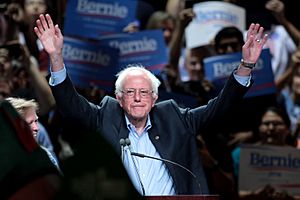
In the 2016 presidential election, the DSA endorsed Sanders for president. Sanders's candidacy prompted a surge in DSA membership among young voters. After Sanders lost to Hillary Clinton in the 2016 Democratic primaries, the DSA called for Republican nominee Donald Trump's defeat, but did not officially endorse Clinton.
In 2020, the DSA endorsed Sanders for president again after an advisory poll reported 76% of the participating membership approved his endorsement, despite objections from part of the membership about Sanders's statements on, among other topics, slavery reparations. No other candidates were included in the poll. After Sanders dropped out in April 2020, the DSA explicitly did not endorse the presumptive Democratic nominee, Joe Biden. Two DSA chapters (Colorado Springs and Salt Lake City) voted to endorse Green Party nominee Howie Hawkins.
In May 2020, 91 "founders, officers and activists" of the Students for a Democratic Society (SDS) in the 1960s criticized the DSA's failure to endorse Biden in an open letter "to the New New Left From the Old New Left" published in The Nation. Daniel Finn of Jacobin responded that in invoking the specter of fascism under a second-term Trump, the former SDSers were engaging in "melodramatic hyperbole", and that climate change was not an issue that could wait until 2024 or 2028. "No socialist", he argued, "who campaigned for Bernie Sanders should feel guilty about abandoning [the Democrats] and concentrating on building a movement that is the only real hope for the planet's future".
In 2023, DSA member and former DSA honorary chair Cornel West announced his campaign in the 2024 United States presidential election, initially with the People's Party, then with the Green Party, and then in October 2023 as an independent candidate. As of February 2024[update], the DSA has not made an endorsement in the 2024 general presidential race, and DSA members have expressed split views on West's campaign despite widespread admiration for him, with some citing controversies within the People's Party or the potential for a spoiler effect, and others arguing the campaign could be an opportunity to make socialist ideas more visible.
Congressional elections
Current endorsed members
- Alexandria Ocasio-Cortez, NY-14
- Rashida Tlaib, MI-12
- Cori Bush, MO-1
On June 26, 2018, DSA member and endorsee Alexandria Ocasio-Cortez won the Democratic primary against incumbent Representative Joseph Crowley in New York's 14th congressional district in an upset, virtually guaranteeing her the congressional seat in the heavily Democratic district, which spans parts of the Bronx and Queens. House Minority Leader Nancy Pelosi dismissed the win as "not to be viewed as something that stands for anything else" and said it represented change only in one progressive district. In contrast, Democratic National Committee head Tom Perez called Ocasio-Cortez "the future of our party". The Trotskyist International Committee of the Fourth International critiqued her and the DSA as a "left" cover for the "right-wing Democratic Party", particularly in regard to foreign policy. Six weeks after Ocasio-Cortez's primary victory, DSA member and endorsee Rashida Tlaib won the Democratic primary in Michigan's 13th congressional district. Both Ocasio-Cortez and Tlaib won their general elections to become members of Congress.
Ocasio-Cortez's victory and the subsequent publicity for the DSA led more than 1,000 new members to join the organization the next day, approximately 35 times the daily average.
In the 2020 elections, at least 36 DSA members won office, earning more than 3.1 million votes. Four DSA members were elected to the U.S. House of Representatives, including incumbents Ocasio-Cortez and Tlaib and newly elected members Jamaal Bowman and Cori Bush. DSA members were unsuccessful in being elected to the House in West Virginia (WV-2), Mississippi (MS-1) and California (CA-12).
In Tennessee, Marquita Bradshaw won the Democratic nomination for the 2020 Senate election in an upset. Initially not nationally endorsed, she was endorsed by the Memphis-Midsouth chapter of DSA and after her primary victory was also endorsed by Tennessee's other DSA chapters, in Knoxville, Chattanooga, Middle and Northeast Tennessee. She lost the general election to Bill Hagerty.
In November 2022, Greg Casar was the fifth DSA member jointly elected to the House, though he was not endorsed due to his stances on Palestine. In the following year, Bowman announced that he had stopped paying his membership dues, and Shri Thanedar, who had quietly joined the organization, was expelled for having substantial disagreement with its principles.'
State and local elections
In the United States elections of 2017, the DSA endorsed 15 candidates for office, with the highest position gained being that of Lee J. Carter in the Virginia House of Delegates. DSA members won 15 electoral offices in 13 states, bringing the total to 35 (having changed its electoral strategy at its national convention, the DSA had anticipated picking up approximately five seats) 56% of the DSA members who ran in this election cycle won, compared to 20% in 2016. These results encouraged dozens more DSA members to run for office in the 2018 elections.
In the 2018 midterm elections, DSA anticipated reaching 100 elected officials nationwide from its strategic down-ballot campaigns, with most of those in state and local races. 39 formally endorsed people ran for office at the state and local levels in 20 states, including Florida, Hawaii, Kansas and Michigan; Maine's Zak Ringelstein, a Democrat, was its sole senatorial candidate. Local chapters endorsed around 110 candidates in total. Four female DSA members (Sara Innamorato, Summer Lee, Elizabeth Fiedler and Kristin Seale) won Democratic primary contests for seats in the Pennsylvania House of Representatives, with Innamorato and Lee defeating incumbents. Additionally, Jade Bahr and Amelia Marquez won their primaries in Montana for the State House and Jeremy Mele won his primary for the Maine House of Representatives. In California, Jovanka Beckles won one of the top two spots in the primary and advanced to the general election for a State Assembly seat in the East Bay. Ultimately, about a dozen members (or non-members who were endorsed) won office in state legislatures. In the aggregate, the DSA had backed 40 winning candidates at the state, county and municipal levels. DSA members elected to state legislatures in 2018 include Hawaii Representative Amy Perruso, New York Senator Julia Salazar, and Pennsylvania Representatives Fiedler, Innamorato, and Lee.
The 2019 Chicago aldermanic elections saw six DSA members elected to the 50-seat Chicago City Council: incumbent Carlos Ramirez-Rosa and newcomers Daniel La Spata, Jeanette Taylor, Byron Sigcho-Lopez, Rossana Rodriguez-Sanchez, and Andre Vasquez. The six newly elected DSA members informally organized the Chicago City Council Socialist Caucus in 2019, later formalizing it in 2021 as the Democratic Socialist Caucus. In the 2019 off-year elections, DSA members made further gains by capturing over a half dozen city council seats across the country; Dean Preston became the first democratic socialist elected to the San Francisco Board of Supervisors in 40 years, while Lee Carter was reelected to the Virginia House of Delegates.
In 2020, the DSA made significant gains in state legislatures. Over 30 DSA members and endorsed (either nationally or by local chapters) candidates were elected in 16 states, including five in Pennsylvania and seven in New York. Notable victories were in West Philadelphia, where Rick Krajewski beat a 35-year incumbent, and in New York City, where a slate of five candidates was (re)elected to the state house and the state senate. All DSA incumbents were reelected, with the sole exception of Jade Bahr, who lost her race for the Montana House of Representatives.
Dozens of DSA members and affiliated candidates have won races for local offices since 2020. Most notably, Nithya Raman, endorsed by the national DSA, won her race for Los Angeles city council in district 4, and Janeese Lewis George won her race for Washington, D.C. city council ward 4, after winning her primary against incumbent Brandon Todd. Dean Preston was reelected to the San Francisco Board of Supervisors. José Garza was elected as district attorney for Travis County in Texas and Gabriella Cázares-Kelly was elected county recorder in Pima County, Arizona Other DSA-affiliated candidates were elected to city councils in Austin, Aurora, Oakland, Burbank, Berkeley, Mountain View, South San Francisco, Redwood City, Sacramento, Burlington, Madison, Stoughton, St. Petersburg, and Portland, Maine.
In March 2021, an all-DSA leadership of a state Democratic party was elected for the first time in its history, sweeping the leadership of the Nevada Democratic Party. After the elections, the entire Nevada Democratic Party staff resigned. On March 4, 2023, a "unity" slate of candidates was elected, ending DSA leadership of the party. In February 2023, the DSA's Las Vegas chapter said that communication between the slate and the chapter had faltered and the slate had become increasingly moderate over its term despite initial statements in favor of democratic socialist causes. From this experience, the chapter wrote in opposition to both entryism in the Democratic Party and solely focusing on electoral organizing as formidable strategies for socialist organizers:
This is our lesson, and we hope socialists everywhere will pay close attention: the Democratic Party is a dead end. It is a "party" in name only; truly, it is simply a tangled web of dark money and mega-donors, cynical consultants, and lapdog politicians. ... We don't want milquetoast progressive reformist-reforms; we want socialism. We won't get it by playing the DNC's games, and we won't get it by being a mildly obnoxious thorn in their side, either. Our task is to out-organize them entirely, and not merely within the confines of the voting booth.
In June 2021, the Buffalo, New York chapter-endorsed candidate, India Walton, won the Democratic Party primary election for mayor, defeating incumbent Byron Brown. Following the primary election loss, Brown qualified for the general election as a write-in candidate. In November 2021, Walton lost the mayoral race to Brown, who earned 38,338 write-in votes to Walton's 25,773 votes.
At the 2023 DSA National Convention, delegates declared school board elections to be an electoral priority. Jacobin and the New York Post both noted the success of DSA candidates in school board elections in at least 15 states since 2021 from left- and right-wing perspectives, respectively, including that such candidates ran on supporting transgender rights, fighting systemic racism, and supporting teachers' unions and funding for public education.
See also
 In Spanish: Socialistas Democráticos de América para niños
In Spanish: Socialistas Democráticos de América para niños
- American Left
- Democratic socialism
- List of Democratic Socialists of America public officeholders
- Socialist Party of America
- Socialist Party USA
- Green Party (United States)
- Communist Party USA
- The Squad (United States Congress)


